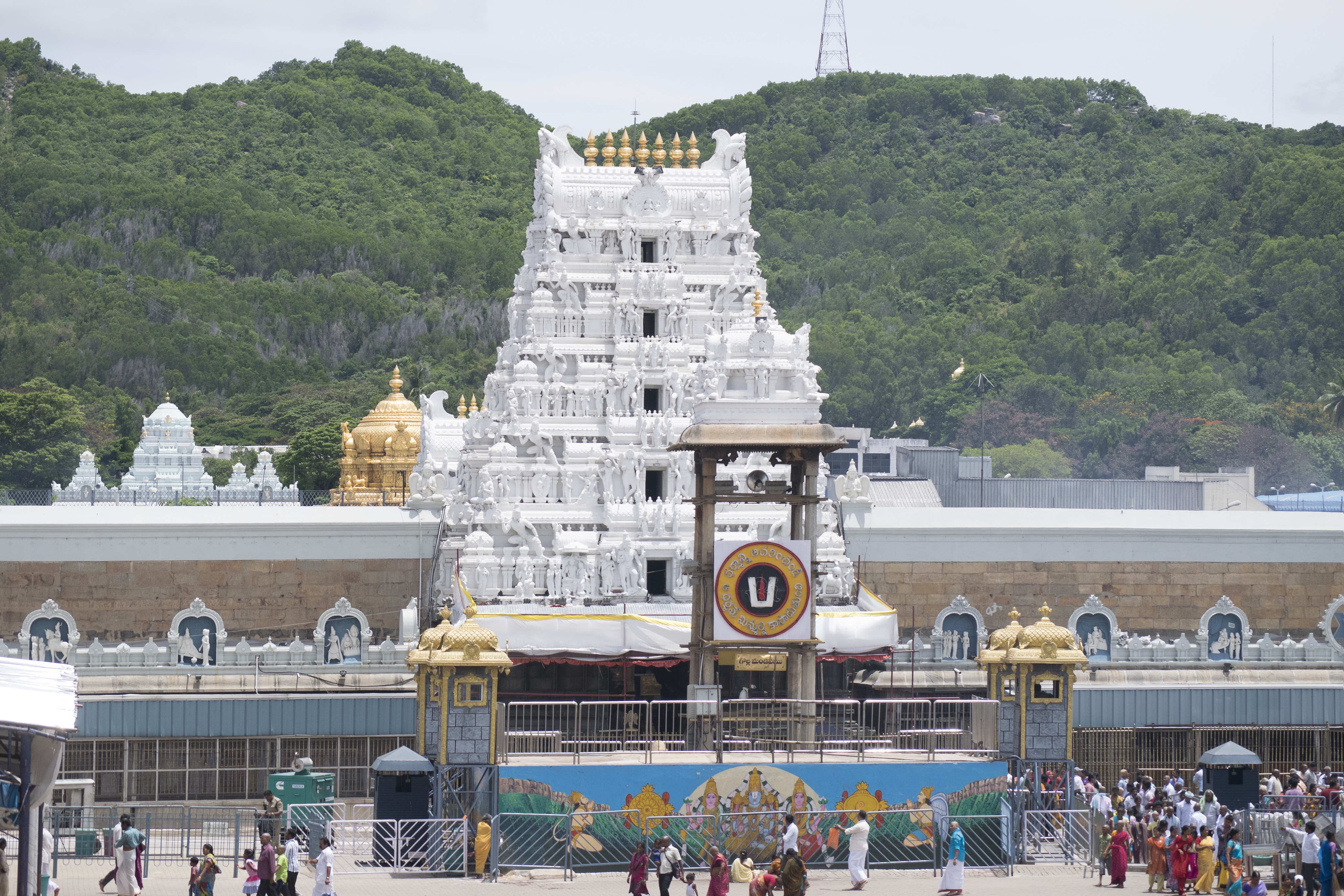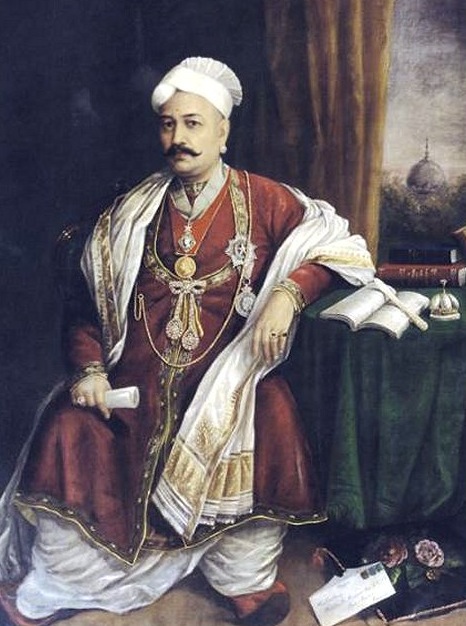|
Satyanidhi Tirtha
Satyanidhi Tirtha (1580 - 1660) was a Hindu philosopher, scholar and saint. He served as the pontiff of Shri Uttaradi Math from 1638–1660. He was the 19th in succession from Madhvacharya. Satyanidhi Tirtha ruled the pontificate with a remarkable distinction. His life was a saga of supreme spiritual achievements. Life Most of the information about his life is derived from two hagiographies: one is Gurucarya, a hagiological work on the Pontiffs of the Uttaradi Math and the other one is ''Satyanidhivilasa'' by Sarkara Srinivasa. Born as Kaulagi Raghupathyacharya into Deshastha Madhva Brahmin family of scholars to Purushothamacharya and Satyadevi in Puntamba, Maharashtra. He studied Vyakarana and Shastras under Kumbhari Vasudevacharya. He was ordained and was made the pontiff of Uttaradi Math in 1638. He served as pontiff of mutt for 21 years and 9 months. After his death in 1660, his mortal remains were enshrined in the mutt at Kurnool. He was succeeded by Satyanatha Tirth ... [...More Info...] [...Related Items...] OR: [Wikipedia] [Google] [Baidu] |
Hinduism
Hinduism () is an Indian religion or '' dharma'', a religious and universal order or way of life by which followers abide. As a religion, it is the world's third-largest, with over 1.2–1.35 billion followers, or 15–16% of the global population, known as Hindus. The word ''Hindu'' is an exonym, and while Hinduism has been called the oldest religion in the world, many practitioners refer to their religion as '' Sanātana Dharma'' ( sa, सनातन धर्म, lit='the Eternal Dharma'), a modern usage, which refers to the idea that its origins lie beyond human history, as revealed in the Hindu texts. Another endonym is ''Vaidika dharma'', the dharma related to the Vedas. Hinduism is a diverse system of thought marked by a range of philosophies and shared concepts, rituals, cosmological systems, pilgrimage sites, and shared textual sources that discuss theology, metaphysics, mythology, Vedic yajna, yoga, agamic rituals, and temple building, among other to ... [...More Info...] [...Related Items...] OR: [Wikipedia] [Google] [Baidu] |
Philosopher
A philosopher is a person who practices or investigates philosophy. The term ''philosopher'' comes from the grc, φιλόσοφος, , translit=philosophos, meaning 'lover of wisdom'. The coining of the term has been attributed to the Greek thinker Pythagoras (6th century BCE).. In the Classics, classical sense, a philosopher was someone who lived according to a certain way of life, focusing upon resolving Meaning of life, existential questions about the human condition; it was not necessary that they discoursed upon Theory, theories or commented upon authors. Those who most arduously committed themselves to this lifestyle would have been considered ''philosophers''. In a modern sense, a philosopher is an intellectual who contributes to one or more branches of philosophy, such as aesthetics, ethics, epistemology, philosophy of science, logic, metaphysics, social theory, philosophy of religion, and political philosophy. A philosopher may also be someone who has worked in the hum ... [...More Info...] [...Related Items...] OR: [Wikipedia] [Google] [Baidu] |
Madhva Religious Leaders
Madhvacharya (; ; CE 1199-1278 or CE 1238–1317), sometimes anglicised as Madhva Acharya, and also known as Purna Prajna () and Ānanda Tīrtha, was an Indian philosopher, theologian and the chief proponent of the ''Dvaita'' (dualism) school of Vedanta. Madhva called his philosophy ''Tattvavāda'' meaning "arguments from a realist viewpoint". Madhvacharya was born on the west coast of Karnataka state in 13th-century India. As a teenager, he became a Sanyasi (monk) joining Brahma-sampradaya guru Achyutapreksha, of the Ekadandi order. Madhva studied the classics of Hindu philosophy, and wrote commentaries on the Principal Upanishads, the ''Bhagavad Gita'' and the Brahma Sutras ('' Prasthanatrayi''), and is credited with thirty seven works in Sanskrit. His writing style was of extreme brevity and condensed expression. His greatest work is considered to be the ''Anuvyakhyana'', a philosophical supplement to his bhasya on the Brahma Sutras composed with a poetic structure. In som ... [...More Info...] [...Related Items...] OR: [Wikipedia] [Google] [Baidu] |
Indian Hindu Saints
Indian or Indians may refer to: Peoples South Asia * Indian people, people of Indian nationality, or people who have an Indian ancestor ** Non-resident Indian, a citizen of India who has temporarily emigrated to another country * South Asian ethnic groups, referring to people of the Indian subcontinent, as well as the greater South Asia region prior to the 1947 partition of India * Anglo-Indians, people with mixed Indian and British ancestry, or people of British descent born or living in the Indian subcontinent * East Indians, a Christian community in India Europe * British Indians, British people of Indian origin The Americas * Indo-Canadians, Canadian people of Indian origin * Indian Americans, American people of Indian origin * Indigenous peoples of the Americas, the pre-Columbian inhabitants of the Americas and their descendants ** Plains Indians, the common name for the Native Americans who lived on the Great Plains of North America ** Native Americans in the Un ... [...More Info...] [...Related Items...] OR: [Wikipedia] [Google] [Baidu] |
Abhinava Chandrika
Abhinava Chandrika (Sanskrit:अभिनव चन्द्रिका); (), is a Sanskrit work on Dvaita philosophy written by Satyanatha Tirtha. It is a lucid adaptation of the well-known commentary on Jayatirthas Tattvaprakāśikā, which is a commentary on Madhvacharya's Brahma-sutra bhashya. It runs to 12,600 granthas and is magnum opus of Satyanatha Tirtha Satyanatha Tirtha (also known as Satyanatha Yati) (Sanskrit:सत्यनाथा तीर्थ); IAST:Śrī Satyanātha Tīrtha) (1648 – 1674), also called ''Abhinava Vyasaraja'', was a Hindu philosopher, scholar, theologian, logi .... References Bibliography * * * * * {{Citation, title= A History of Indian Philosophy, Volume 4, url=https://books.google.com/books?id=Ml2H_z0E7bAC, first=Surendranath, last=Dasgupta, publisher=Motilal Banarsidass Publishers, year=1991, isbn=978-8120804159 Dvaita Vedanta Philosophical literature Sanskrit texts ... [...More Info...] [...Related Items...] OR: [Wikipedia] [Google] [Baidu] |
Vyasatirtha
Vyāsatīrtha (. 1460 – 1539), also called ''Vyasaraja'' or ''Chandrikacharya'', was a Hindu philosopher, scholar, polemicist, commentator and poet belonging to the Madhwacharya's Dvaita order of Vedanta. As the patron saint of the Vijayanagara Empire, Vyasatirtha was at the forefront of a golden age in Dvaita which saw new developments in dialectical thought, growth of the Haridasa literature under bards like Purandara Dasa and Kanaka Dasa and an amplified spread of Dvaita across the subcontinent. Three of his polemically themed doxographical works ''Nyayamruta'', ''Tatparya Chandrika'' and ''Tarka Tandava'' (collectively called ''Vyasa Traya'') documented and critiqued an encyclopaedic range of sub-philosophies in Advaita, Visistadvaita, Mahayana Buddhism, Mimamsa and Nyaya, revealing internal contradictions and fallacies. His ''Nyayamruta'' caused a significant stir in the Advaita community across the country requiring a rebuttal by Madhusudhana Saraswati through hi ... [...More Info...] [...Related Items...] OR: [Wikipedia] [Google] [Baidu] |
Shastras
''Shastra'' (, IAST: , ) is a Sanskrit word that means "precept, rules, manual, compendium, book or treatise" in a general sense.Monier Williams, Monier Williams' Sanskrit-English Dictionary, Oxford University Press, Article on 'zAstra'' The word is generally used as a suffix in the Indian literature context, for technical or specialized knowledge in a defined area of practice. ''Shastra'' has a similar meaning to English ''-logy'', e.g. ecology, psychology, meaning scientific and basic knowledge on a particular subject. Examples in terms of modern neologisms include # 'physics', # 'chemistry', # 'biology', # 'architectural science', # 'science of mechanical arts and sculpture', # 'science of politics and economics', and # 'compendium of ethics or right policy'. In Western literature, ''Shastra'' is sometimes spelled as Sastra, reflecting a misunderstanding of the IAST symbol 'ś', which corresponds to the English 'sh'. Etymology The word ''Śāstra'' literally ... [...More Info...] [...Related Items...] OR: [Wikipedia] [Google] [Baidu] |
Deshastha Brahmin
Deshastha Brahmin is a Hindu Brahmin subcaste mainly from the Indian state of Maharashtra and northern area of the state of Karnataka. Other than these states, according to authors K. S. Singh, Gregory Naik and Pran Nath Chopra, Deshastha Brahmins are also concentrated in the states of Telangana , Andhra Pradesh and Madhya Pradesh Author Pran Nath Chopra and journalist Pritish Nandy says, "Most of the well-known saints from Maharashtra, Karnataka and Andhra Pradesh were Deshastha Brahmins". The mother tongue of Deshastha Brahmins is either Marathi or Kannada. Some Deshasthas who settled in Telugu states also adopted Telugu as their mother tongue. Over the millennia, the Deshastha community has produced Mathematicians such as Bhāskara II, Sanskrit scholars such as Bhavabhuti; Bhakti saints such as Dnyaneshwar, Sripadaraja, Eknath, Purandara Dasa, Samarth Ramdas and Vijaya Dasa; Logicians such as Jayatirtha and Vyasatirtha. The traditional occupation of Deshastha Brahmins ... [...More Info...] [...Related Items...] OR: [Wikipedia] [Google] [Baidu] |
Hagiographies
A hagiography (; ) is a biography of a saint or an ecclesiastical leader, as well as, by extension, an adulatory and idealized biography of a founder, saint, monk, nun or icon in any of the world's religions. Early Christian hagiographies might consist of a biography or ', a description of the saint's deeds or miracles (from Latin ''vita'', life, which begins the title of most medieval biographies), an account of the saint's martyrdom (called a ), or be a combination of these. Christian hagiographies focus on the lives, and notably the miracles, ascribed to men and women canonized by the Roman Catholic church, the Eastern Orthodox Church, the Oriental Orthodox churches, and the Church of the East. Other religious traditions such as Buddhism, Hinduism, Taoism, Islam, Sikhism and Jainism also create and maintain hagiographical texts (such as the Sikh Janamsakhis) concerning saints, gurus and other individuals believed to be imbued with sacred power. Hagiographic works, especiall ... [...More Info...] [...Related Items...] OR: [Wikipedia] [Google] [Baidu] |
Madhvacharya
Madhvacharya (; ; CE 1199-1278 or CE 1238–1317), sometimes Anglicisation, anglicised as Madhva Acharya, and also known as Purna Prajna () and Ānanda Tīrtha, was an Indian philosopher, theologian and the chief proponent of the ''Dvaita'' (dualism) school of Vedanta. Madhva called his philosophy ''Dvaita Vedanta, Tattvavāda'' meaning "arguments from a realist viewpoint". Madhvacharya was born on the west coast of Karnataka state in 13th-century India. As a teenager, he became a Sannyasa, Sanyasi (monk) joining Brahma-sampradaya guru Achyutapreksha, of the Ekadandi order. Madhva studied the classics of Hindu philosophy, and wrote commentaries on the Principal Upanishads, the ''Bhagavad Gita'' and the Brahma Sutras (''Prasthanatrayi''), and is credited with thirty seven works in Sanskrit. His writing style was of extreme brevity and condensed expression. His greatest work is considered to be the ''Anuvyakhyana'', a philosophical supplement to his bhasya on the Brahma Sutras ... [...More Info...] [...Related Items...] OR: [Wikipedia] [Google] [Baidu] |





